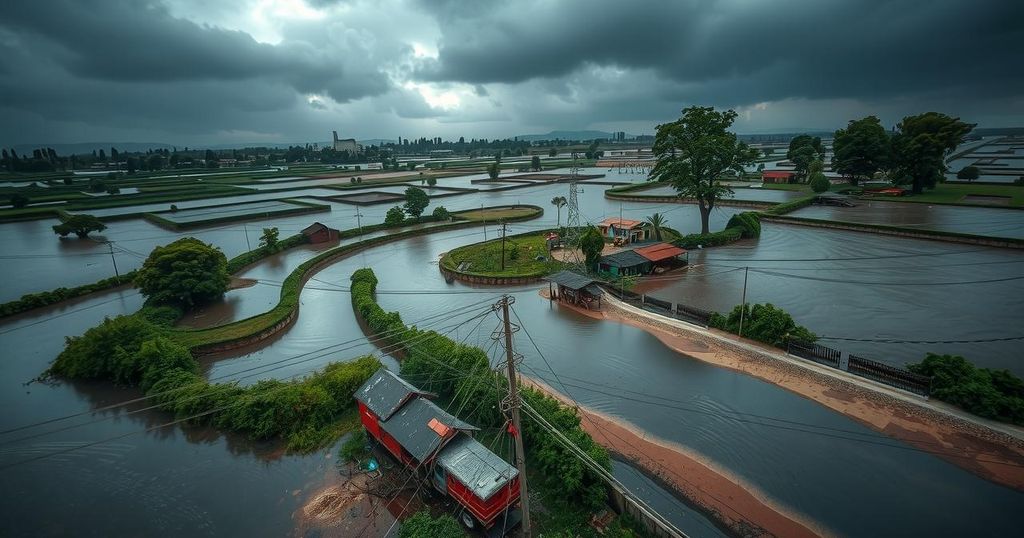Severe flooding, worsened by climate change, has devastated central Nigeria and many parts of Africa, affecting millions and threatening food security. The situation has escalated in Kogi State, where floods have become a recurring crisis since 2012. Reports indicate significant damage, loss of life, and displacement across West and Central Africa, underscoring the urgent need for global climate action to mitigate further disaster.
In the past twelve years, the annual rainy season has resulted in severe flooding that has repeatedly inundated the home of 67-year-old Idris Egbunu in central Nigeria. Each flooding event follows a familiar pattern: the Niger River overflows, displacing families and leaving behind significant damage that necessitates extensive repairs. This is particularly evident in Lokoja, Kogi State, where the Niger intersects with its principal tributary, the Benue River. Tragically, the frequency and intensity of these floods have escalated due to climate change, challenging the resilience of millions across Africa. In 2024, approximately 6.9 million individuals in West and Central Africa have been adversely impacted by extreme flooding, as reported by the United Nations Office for the Coordination of Humanitarian Affairs (OCHA). Reports indicate that the situation has worsened since 2012, with Kogi State experiencing some of its most catastrophic floods on record. Although current flooding levels have not yet matched the devastation seen in 2022—when over 500 lives were lost, and 1.4 million were displaced—it is nonetheless alarming, with around two million residents affected this year alone. Local officials express deep concern for the current situation, describing the conditions as “very, very bad.” The scale of destruction is equally dire: Fatima Bilyaminu, a resident of the Adankolo district in Lokoja, can only access her home via boat, having lost most of her possessions to the relentless waters. Moreover, despite facing continuous flooding, many residents have no financial means to relocate, forcing them to endure these hardship-filled cycles. According to the World Meteorological Organization, Africa bears the brunt of climate change while contributing only four percent to global greenhouse gas emissions. The year 2024 is projected to become the hottest on record, with an unprecedented amount of rainfall resulting in extreme weather events across the continent. Aida Diongue-Niang of the UN’s Intergovernmental Panel on Climate Change (IPCC) emphasizes the significant increase in rainfall intensity, cautioning that prevailing weather patterns, including the recent conditions in the Sahel region, have become alarmingly extreme. Countries such as Niger and Chad have faced catastrophic rainfall, resulting in widespread loss of life and severe infrastructural damage. Conversely, the flooding has caused entire neighborhoods in Bamako, Mali’s capital, to submerge, leading to unsanitary conditions due to the mix of toxic waste and floodwaters. The adverse effects of flooding have even disrupted the academic calendar in several regions. Experts warn that the increasing frequency of such extreme conditions marks a significant shift from previous cycles of flooding, indicating a potentially calamitous trend driven by ongoing greenhouse gas emissions. The IPCC has urged governments to adopt more sustainable practices and to prioritize the mitigation of climate change through coordinated global efforts, advising that humanity as a whole bears responsibility for addressing this crisis. The myriad of climate-driven challenges facing Africa illuminates the pressing need for urgent action both locally and internationally.
The article discusses the escalating impact of climate change on flooding in Africa, particularly focusing on the adverse effects in Nigeria’s Kogi state. With a notable increase in flooding events over the past twelve years, the residents are facing devastating consequences, including loss of property, disruption to livelihoods, and threats to food security. The discussion encompasses broader regional implications, including disaster response challenges and the urgent need for global action to combat climate change, which disproportionately affects regions with minimal contributions to greenhouse gas emissions. The statistics provided are supported by reputable international organizations such as the United Nations, which highlights the plight of millions living in vulnerable conditions across the continent.
In summary, the article outlines a critical overview of the devastating impact of climate change-induced flooding in Africa, particularly in Nigeria. With millions affected and significant damage reported, the situation reflects a growing and alarming trend toward increased flooding severity. Urgent interventions are necessary at both national and international levels to address the causes of climate change and alleviate the suffering of affected populations. The responsibility for enacting change rests collectively with the global community, emphasizing the need for unified action against climate change to protect vulnerable populations.
Original Source: phys.org






